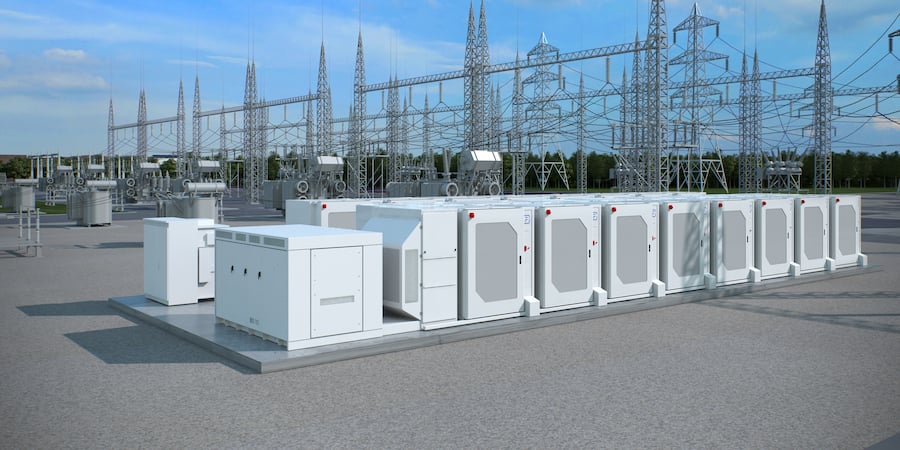
A 10MW / 20MWh battery energy storage project in Belgium has achieved financial close and is expected to begin construction shortly, the consortium behind the project has said.
The lithium-ion battery energy storage system (BESS) will be built in the town of Bastogne in Belgium’s southern Wallonia region. EStor-Lux, the consortium developing it, comprises public and private partners, including players in Belgium’s offshore wind industry and Wallonia’s local government’s investment group.
Enjoy 12 months of exclusive analysis
- Regular insight and analysis of the industry’s biggest developments
- In-depth interviews with the industry’s leading figures
- Annual digital subscription to the PV Tech Power journal
- Discounts on Solar Media’s portfolio of events, in-person and virtual
Europe is host to some 80% of the world’s offshore wind capacity, the European Union targets carbon neutrality by 2050 and Belgium has committed to phasing out nuclear by 2025. However, EStor-Lux said in a press release that rolling out battery storage technology at scale – strongly expected to be required to balance the system as more and more renewables come onto the grid – remains challenging in the absence of the sorts of policy support schemes that have support wind and solar in European countries in the past.
However, the Bastogne project has raised funds including project financing from sustainable bank Triodos and construction will get underway “in a few days’ time”, expected to be completed by the middle of next year. Technology provider Fluence will supply, install and maintain the energy storage system while Centrica Business Solutions Belgium will dispatch and trade the battery’s capabilities and capacity.
At two hours’ duration, the system is longer duration than many of the large-scale projects seen to date using lithium-ion batteries in Europe. Project manager Pierre Bayart said this means that, “compared to the 30 minute to 1 hour durations that are currently the standard for storage duration in Europe,” the battery system will be able to provide “a wider range of services with higher added value to the grid operator and market players.”
Also key to the business model is that the battery storage will be aggregated along with other types of distributed energy resources (DERs) into a pool of resources, Bayart said. With the system able to provide balancing capacity to the grid both upwards as well as downwards i.e. charging from it as well as discharging when needed, Estor-Lux claimed the system can “offer a total alternative to thermal power plants”.
Clean business is good business
“This is an important step, demonstrating that battery energy storage projects provide a fully-fledged alternative to conventional flexible capacity, and are therefore completely viable even without government support,” Pierre Bayart said.
It can provide energy to the grid when the grid needs it in times of low renewable energy generation, or offer balancing services to mitigate mistakes in consumption or generation forecasting. Consortium Estor-Lux said that this initial project’s “proven solutions” will be replicated on a larger scale.
Cédric Legros, Pierre Bayart’s colleague and co-project manager, said that securing project financing in the form of a non-recourse bank loan from Triodos “is a significant step forward in developing future capacity.”
“It means that it’s possible to persuade banks that a business model directly exposed to market fluctuations is perfectly viable with a smart market positioning. This is great news, because every solution for this initial project was developed with a mindset toward enabling replicability on a larger scale.”
In a June interview with Energy-Storage.news, Belgium was identified as one of Europe’s most attractive potential markets for energy storage, according to Michael Salomon, CEO of energy storage consultancy firm Clean Horizon.
The Estor-Lux 10MW / 20MWh system is thought to be the largest in the country. The first 1MW battery storage system in Belgium to provide frequency containment reserve (FCR) ancillary services was installed by system integrator Alfen in 2017, participating in joint auctions with neighbouring European countries, while a 1.2MW / 720kWh system utilising second life electric vehicle (EV) batteries went into operation early this year and in 2018 what was then thought to be the largest pilot project for commercial and industrial (C&I) energy storage in Europe went into action. The 4.2MWh of storage capacity in that project included a combination of lithium-ion and flow batteries.
Belgium has “always had flexibility issues nationwide” and prior to joining the European common market for primary reserve experienced very high prices for this grid service. Meanwhile a market for secondary reserve is expected to open in the country and a major reason the nuclear fleet is being retired is because it is old, Salomon said. An article from Clean Horizon market analyst Naim El Chami for our quarterly technical journal PV Tech Power (Vol.24) took a closer look at opportunities for energy storage emerging in Belgium and other markets in Europe. Paid subscription is required to read the full article, but you can find an excerpt of the opening passages here on Energy-Storage.news.
“Electricity prices are set to become increasingly volatile and harder to forecast due to the development of wind and solar capacity, while the electrification of our energy needs, in terms of heating and transport, will increase our dependence on this commodity. Every player on the electricity market, but also every industrial – and even domestic – electricity consumer will potentially soon benefit from integrating battery storage into their energy strategy,” Estor-Lux project manager Pierre Bayart said.
Bayart added that Estor-Lux wants to become a supplier of turnkey energy storage solutions to meet this anticipated demand.
“How quickly we can achieve this ambition will, however, depend on the political and regulatory framework, and especially on the potential positive or negative impact of the capacity remuneration mechanism that Belgium intends to put in place,” Bayart said.






